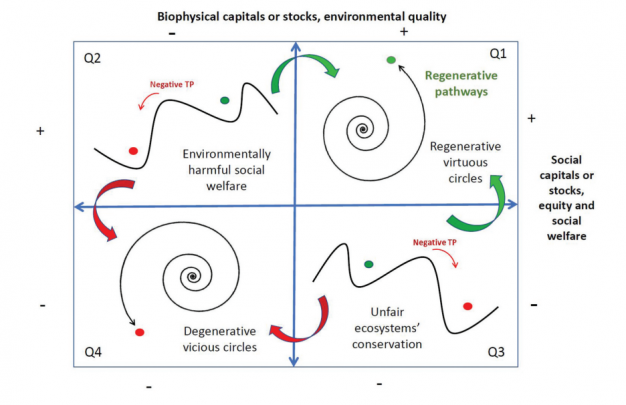
Regenerative sustainability: TRANSPATH’s first scientific publication
New paper, published in Environmental Sociology and written by project partner Dr. J. David Tàbara from Sustainabilogy, discusses the need for a relational approach to address global environmental change problems by presenting a conceptual framework to explore regenerative sustainability pathways - those that do not only reduce harm or achieve neutral targets or outcomes but also create the transformative conditions for net-positive outcomes both in social and biophysical indicators.
The article, titled “Regenerative sustainability. A relational model of possibilities for the emergence of positive tipping points”, suggests that dealing in effective and equitable ways with global environmental change and long-term sustainability requires deep transformations in how we conceive and engage with social and biophysical systems interactions. For that, the author proposes a relational model to help think of individuals, organisations, and societies as interconnected social-ecological systems. This perspective emphasises the need to synergise social and biophysical capitals and strategies and argues that transformations are needed at the same time in the main four subsystems that make any social formation possible in the first place, and in particular in: social and institutional rules and arrangements (S), the use of energy and natural resources (E), in information and knowledge systems (I), and accumulated environmental change (C). Following this SEIC conceptual model, it is possible to conceive that not all cumulative environmental change derived from social-ecological interactions has to be necessarily degenerative or harmful (like GHGs) but can also be regenerative. Indeed, regenerative outcomes are possible in theory, albeit not necessarily likely, as eventually they will depend on individuals, organisations and societies‘ learning attitudes and practices to engage massively in those goals, e.g. by reframing new ways to understand emancipation and freedom and creating full new practices across all levels of action.
Tàbara’s article contributes to the TRANSPATH project’s mission to identify leverage points and interventions for triggering transformative changes at consumer, producer and organisational levels through inclusive deliberation.
Read the full paper here.
Photo: Figure 2. (from the article): Moving towards regenerative development pathways depends on the extent to which human-systems interactions contribute to improving and restoring both social and biophysical capitals at the same time (Q1). In quadrants Q2 and Q3 social-ecological systems are instable and tend to move toward negative development pathways or negative basins of attraction, eventually leading to degenerative vicious circles of development (Q4). In Q4 not only future opportunities for human welfare, dignity and equity are reduced, but also the basic conditions that make life possible on Earth are undermined. Achieving a netpositive tipping point leading towards Q1 requires deep transformations in social-environmental practices at different levels of agency and also in the ways humans conceive and perform all SEIC subsystems’ interactions.